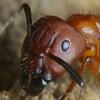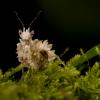- Formiculture.com
- Forums
- Gallery
- Members
- Member Map
- Chat

Trap-Jaw Ant Food
Started By
AntswerMe
, Jun 28 2017 6:14 AM
8 replies to this topic
#1
 Offline
-
Posted June 28 2017 - 6:14 AM
Offline
-
Posted June 28 2017 - 6:14 AM
Hey there, I have two Odondomachus brunneus queens that have both laid eggs in their tube set-ups. I have provided them with foraging areas and some digger wasp larva as well as parts of earwigs, but they won't touch any of it. They haven't eaten for about 5-6 days now (I caught them about that long ago and fed them shortly after and today, but they haven't eaten at all) and I'm getting concerned about their hunger. Do they just not eat very often, or do they not want what I gave them? If the latter, what other foods should I feed them?
#2
 Offline
-
Posted June 28 2017 - 9:26 AM
Offline
-
Posted June 28 2017 - 9:26 AM
Wish I could help AntswerMe, I just remember hearing on AntsCanada I think that they are very picky about their food, and at least until the colony gets very numerous they will avoid that is too big, i.e. bigger than any ant itself. So I'd try very small chunks of various food that is a good bit small than the ants themselves. Just my guessing, however! Good luck!
By the way, I see you are in Florida, are trap-jaw ants common around there? I had no idea they were even in the U.S.! Thanks.
#3
 Offline
-
Posted June 28 2017 - 10:00 AM
Offline
-
Posted June 28 2017 - 10:00 AM
Feed them termites and/or fruit flies. Small, soft-bodied prey is best.
Edited by drtrmiller, June 28 2017 - 10:00 AM.
byFormica® is the manufacturer of the iconic nectar feeders and Sunburst Ant Nectar.
byFormica ant products always deliver consistent performance, convenience,
and reliability, making them among the most beloved ant foods and kit enjoyed by
ant keeping enthusiasts worldwide. For more information, visit www.byFormica.com.
#4
 Offline
-
Posted June 28 2017 - 10:10 AM
Offline
-
Posted June 28 2017 - 10:10 AM
Thanks for the input! I'll try some smaller portions of food. As for the ants' presence, Odondomachus brunneus is a native species of trap-jaw ant in the Southeastern U.S. and extends from Florida to areas in Georgia, Alabama, and Mississippi.Wish I could help AntswerMe, I just remember hearing on AntsCanada I think that they are very picky about their food, and at least until the colony gets very numerous they will avoid that is too big, i.e. bigger than any ant itself. So I'd try very small chunks of various food that is a good bit small than the ants themselves. Just my guessing, however! Good luck!
By the way, I see you are in Florida, are trap-jaw ants common around there? I had no idea they were even in the U.S.! Thanks.
#5
 Offline
-
Posted June 28 2017 - 10:10 AM
Offline
-
Posted June 28 2017 - 10:10 AM
Darn my thing double-posted. It's ok.
Edited by AntswerMe, June 28 2017 - 10:17 AM.
#6
 Offline
-
Posted June 28 2017 - 10:10 AM
Offline
-
Posted June 28 2017 - 10:10 AM
Thanks for the input! I'll try some smaller portions of food. As for the ants' presence, Odondomachus brunneus is a native species of trap-jaw ant in the Southeastern U.S. and extends from Florida to areas in Georgia, Alabama, Mississippi, and Louisiana.Wish I could help AntswerMe, I just remember hearing on AntsCanada I think that they are very picky about their food, and at least until the colony gets very numerous they will avoid that is too big, i.e. bigger than any ant itself. So I'd try very small chunks of various food that is a good bit small than the ants themselves. Just my guessing, however! Good luck!
By the way, I see you are in Florida, are trap-jaw ants common around there? I had no idea they were even in the U.S.! Thanks.
Edited by AntswerMe, June 28 2017 - 10:14 AM.
#7
 Offline
-
Posted June 28 2017 - 10:18 AM
Offline
-
Posted June 28 2017 - 10:18 AM
Okay, I'll do it. Hope they eat.Feed them termites and/or fruit flies. Small, soft-bodied prey is best.
Edited by AntswerMe, June 28 2017 - 10:18 AM.
#8
 Offline
-
Posted June 28 2017 - 11:57 AM
Offline
-
Posted June 28 2017 - 11:57 AM
Small prey is important at first. The Odontomachus native to the US are fairly timid ants.
Earwigs, termites, small flies, roach nymphs, flour beetle larvae, and fruit flies have been the staple of all my Odontomachus queens and colonies. All are normally offered live, but prey items are normally no bigger than half the size of a worker/queen. Workers become much more bold in larger colonies and will tackle insects bigger than themselves. They're entirely insectivorous and require no carbohydrates, but due to this require appropriately sized insects often. (nearly everyday)
Small insects fed often, warm and humid nests, and an appropriate substrate for larval pupation are all that's needed to keep them thriving.
Earwigs, termites, small flies, roach nymphs, flour beetle larvae, and fruit flies have been the staple of all my Odontomachus queens and colonies. All are normally offered live, but prey items are normally no bigger than half the size of a worker/queen. Workers become much more bold in larger colonies and will tackle insects bigger than themselves. They're entirely insectivorous and require no carbohydrates, but due to this require appropriately sized insects often. (nearly everyday)
Small insects fed often, warm and humid nests, and an appropriate substrate for larval pupation are all that's needed to keep them thriving.
#9
 Offline
-
Posted June 29 2017 - 10:17 AM
Offline
-
Posted June 29 2017 - 10:17 AM
Termites or fruit flies. It always gets my picky ants to eat.
Proverbs 6:6-8 New International Version (NIV)
6 Go to the ant, you sluggard;
consider its ways and be wise!
7 It has no commander,
no overseer or ruler,
8 yet it stores its provisions in summer
and gathers its food at harvest.
1 user(s) are reading this topic
0 members, 1 guests, 0 anonymous users















